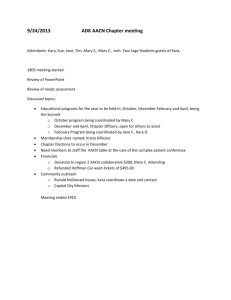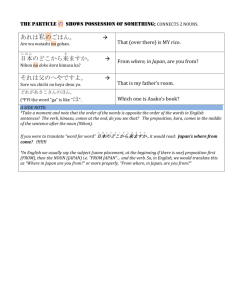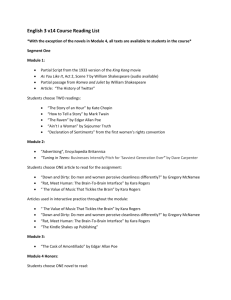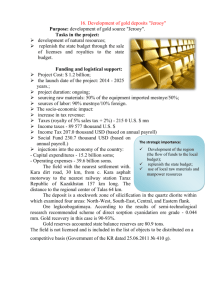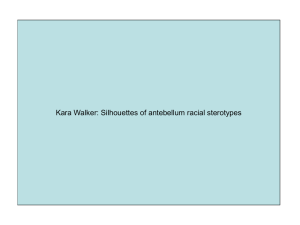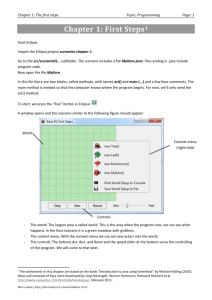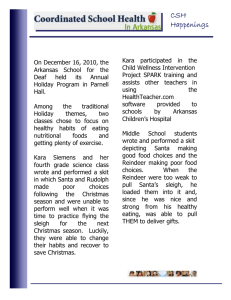Document 8501068
advertisement
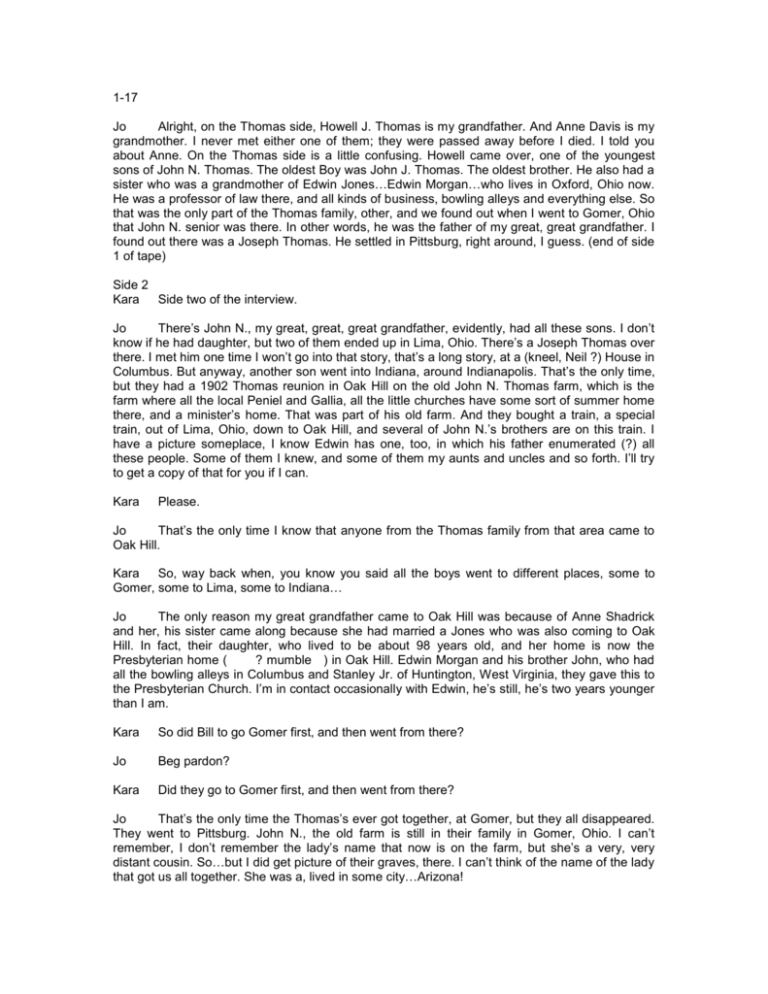
1-17 Jo Alright, on the Thomas side, Howell J. Thomas is my grandfather. And Anne Davis is my grandmother. I never met either one of them; they were passed away before I died. I told you about Anne. On the Thomas side is a little confusing. Howell came over, one of the youngest sons of John N. Thomas. The oldest Boy was John J. Thomas. The oldest brother. He also had a sister who was a grandmother of Edwin Jones…Edwin Morgan…who lives in Oxford, Ohio now. He was a professor of law there, and all kinds of business, bowling alleys and everything else. So that was the only part of the Thomas family, other, and we found out when I went to Gomer, Ohio that John N. senior was there. In other words, he was the father of my great, great grandfather. I found out there was a Joseph Thomas. He settled in Pittsburg, right around, I guess. (end of side 1 of tape) Side 2 Kara Side two of the interview. Jo There’s John N., my great, great, great grandfather, evidently, had all these sons. I don’t know if he had daughter, but two of them ended up in Lima, Ohio. There’s a Joseph Thomas over there. I met him one time I won’t go into that story, that’s a long story, at a (kneel, Neil ?) House in Columbus. But anyway, another son went into Indiana, around Indianapolis. That’s the only time, but they had a 1902 Thomas reunion in Oak Hill on the old John N. Thomas farm, which is the farm where all the local Peniel and Gallia, all the little churches have some sort of summer home there, and a minister’s home. That was part of his old farm. And they bought a train, a special train, out of Lima, Ohio, down to Oak Hill, and several of John N.’s brothers are on this train. I have a picture someplace, I know Edwin has one, too, in which his father enumerated (?) all these people. Some of them I knew, and some of them my aunts and uncles and so forth. I’ll try to get a copy of that for you if I can. Kara Please. Jo That’s the only time I know that anyone from the Thomas family from that area came to Oak Hill. Kara So, way back when, you know you said all the boys went to different places, some to Gomer, some to Lima, some to Indiana… Jo The only reason my great grandfather came to Oak Hill was because of Anne Shadrick and her, his sister came along because she had married a Jones who was also coming to Oak Hill. In fact, their daughter, who lived to be about 98 years old, and her home is now the Presbyterian home ( ? mumble ) in Oak Hill. Edwin Morgan and his brother John, who had all the bowling alleys in Columbus and Stanley Jr. of Huntington, West Virginia, they gave this to the Presbyterian Church. I’m in contact occasionally with Edwin, he’s still, he’s two years younger than I am. Kara So did Bill to go Gomer first, and then went from there? Jo Beg pardon? Kara Did they go to Gomer first, and then went from there? Jo That’s the only time the Thomas’s ever got together, at Gomer, but they all disappeared. They went to Pittsburg. John N., the old farm is still in their family in Gomer, Ohio. I can’t remember, I don’t remember the lady’s name that now is on the farm, but she’s a very, very distant cousin. So…but I did get picture of their graves, there. I can’t think of the name of the lady that got us all together. She was a, lived in some city…Arizona! Kara What generation are we on now? Jo Well, we’ve come back to mine, I guess. Kara Okay. Jo So’s I said, the only relative I have in Oak Hill is my sister, Margery, who married ( ? ) Lambert, and my brother Ray, married a James girl. Jodie. They still live in Oak Hill. I had a sister, Winifred, who lived in Columbus, but she was killed by a drunken driver, some years passed. And Howell lived in Oak Hill. Howell died quiet a few years ago. His son, Gary, now lives in my great gran…my grandfather’s home. Joseph J.’s home. He had a hardware store and closed it, the Jones Market Hardware store, that was several years…Harry Thomas. His brother Larry, there. Kara I want to ask you a question about you. I want you to tell me about when you were born, where you were born, where you grew up. What was it like growing up, around here? Jo Well, it was wonderful because, I say, my grandfather and uncle Ed, uncle Dock E. J. (?) had the first two Model T Fords in Oak Hill. There’s stories about them learning. They bought them in the springtime and they were given books to learn how to drive. They bought them in Jackson. Some of the stories about my grandfather was going out to Jefferson Furnace and an ox team was coming across that bridge with (?) Oak Hill put them on the railroad. He got excited, he said “Whoa, Bill! Whoa, whoa, whoa,” and hit the bridge. That’s one story. Uncle Dock, he had to take down fences. I went with Uncle Dock years ago on several house calls. That’s why I was going to become a medicine, a doctor, I guess, maybe, but I didn’t… Kara Are there other stories about (Dock E. or Da-Cu?) Jo Well, I would, from the time I was about 19, 21, and 22 I’d go down to the brick yard with my grandfather in the morning, when I wasn’t going to school, and spend around, so I got to know all the workmen. I became a pain in the neck for them because I’d make mud balls and throw at them, and get up on the elevators and so forth. They all called me Little Jo or Little Da-Cu. And, of course, my grandfather was always Mr. Jones to them, and the Crabtrees and the Allens and the Clarks, they all worked for him at the Jefferson Furnace, most of them, at one time. I think some of those pictures are the Crabtrees and Allens and the Jefferson thing. Kara Over there in the museum, in the archives? Jo In the museum. And he was ( ?mumble ). He even organized a church for them and all of Jefferson Furnace around 1923 or four, when I was a kid with him. In 1924 I became driving, a driver of a Model T Ford, his insistence. About 1926 he bought his first gear shift automobile. He and Uncle Doc used to get a Model T Ford every year. The tires got bad, they traded cars. They knew not to put gas in ( mumble? ) everything else. So when his older brother, Dave, passed away in Benadosha, in ’26, he said “We’d better go up and see Charlie Bowmen at the Oak Hill Chevrolet”. Charlie and he were in (Colben’s ?) together, also, besides…so Charlie had a new Chrysler. He said, “I got just the car your you, since Winnie won’t ride in a Model T,” because he’d haul the men back and forth to brick yard and dusty. They had no showers at that time. So I drove the car home, thinking that I would drive this Chrysler to Benadosha. In the meantime, I forgot to tell you, my mother and father had gone, after he came home from the service, to Columbus, where he was a stationary engineer for Jeffery Manufacturing. In 1926, I got my father and mother to come back to Oak Hill. He was going to be the assistant manager at the brick plant. He pushed a home for them on Kennedy Hill, which is about a mile and a half north of Oak Hill, towards Jackson. I never lived in that home at all, I was there a lot of times. Now, I told you the Davis’s were from Cardiganshire, the Jones’s were from Cardiganshire, and the Williams’s, but the Thomas’s are from Carmarthanshire. Does that ring a bell; do you know where Carmarthanshier is, and Cardiganshire? Kara Yes. Jo Which is now ( Dovid?), isn’t it? Kara Yes. Jo Okay. Kara Well, it used to be (Devid) and it’s moved back and forth. It’s now Carmarthenshire. Jo Anyway, the Davis and the Jones side, or Davis’s and the Thomas side, they’re all Congregationalists, where the Jones and the Williams were Calvinistic Methodists. I love to hear my grandfather tell about his father and John N. Thomas getting into arguments about the difference of theology between Congregationalist and Calvinistic Methodist Church. Well, that’s about all I can tell you. I… Kara Let’s take a break for a second. Jo Huh? Kara Let’s take a break. Jo Well, ( Kara Yes, let’s just take a five minute rest. Jo Okay. ? ) by my school? Break Jo I thought you wanted me to continue about my high school, and so forth. I’ll tell you about ( mumble ?). Kara Well, carry on talking about what we were talking about, and we’ll maybe save the Eisteddfod for another day. Jo Okay. I started school in Oak Hill, in the old school building which was torn down a few years ago. My teacher was Mary Winnie Davis, whose mother was a sister to my grandmother Jones. Bob Hughes and Dave Hughes both started school with me as well as Betty Jane Jenkins, who had the pharmacy in… Kara I know Betty. Jo We all went to school together, Bob and Dave and I and we played football and baseball together. We all went to Ohio University together. Eddie Jane went to Ohio Wesleyan, I remember. But anyway, Leona Hughes and Bob lived in a house about a block and a quarter from our house, and there was a vacant lot, and then there was another house, and that is the house that Ebon Davis ( ? ) and Ima Jean Brunton were married, went to housekeeping there before Eb and Eddie (?) was born. Bob and a bunch of us cleared this vacant lot and made a tennis court and we had a lot of fun there playing tennis together. Eddie Davis liked to play; he’d come over a play with us and play with some of the older guys, also. And Imogene, I think, played a little tennis. Now, before they took the house and gotten married, the house had been the home of Eddie Davis’ mother, who also was raised by Lewis Hughes. Lewis and Ivan….I guess I’d better stay out of that. I’ll tell you about it later. Kara Okay. Jo Anyway, Lewis went to Cleveland and became an automobile executive. A lot of property, and so forth. Later went to Sarasota and made his second fortune, but that’s …He married Leona Hughes, during the Second World War So he knew her, she’s much…he’s quiet a few years older than Leona. Anyway, we graduated from Oak Hill High School in 1932 and there were 32 in our class. We waited fifty years to have our first reunion. Now we have one every year. Last year, Dave Hughes, the undertaker from Athens, and I were the only boys. Well, no, Lawrence Brisker, is Oak Hill. He was in our class and he served quiet a few years on the school board at Oak Hill. He stayed with the clay company there, in Oak Hill. Betty Jane had fallen and she didn’t make this trip. Emma Queen showed up and Mary Lambert were the only girls. Dave Herbert, who lives in Columbus, was in the nursing home. He couldn’t make it. And Ceola Evans, I can’t remember her married name, in Dayton, and she’s in a nursing home. Those are the only ones that was left. We plan to hold another reunion the first week in August. Kara Now, when did Jefferson Furnace close? Jo Jefferson Furnace closed operations completely in 1917, when they tore the plant down. Kara Now, do you remember much about the furnace? Jo Beg pardon? Kara In what year were you born? Jo I was born in 1914. Kara So, you probably don’t remember anything about the furnace. Jo Yes, I remember this. I remember going out there with my grandfather and they had a lot of mules and horses, a big barn, and I remember it wasn’t in operation, but there were a lot of iron stocked around there. I remember that part, then later on, I’d go with my grandfather. He had quiet a bit of property. He’d go out and check on it, especially around Horeb and on out through what they call Cub Run, and he would check on that. He had leased some of his property and he would check on it occasionally. He would take fences down and take his old Model T anyplace he wanted to go. Kara Do you remember them telling any stories? Jo Hhmm? Kara Do you remember them telling any stories to you about what it was like in the furnace when it was all working? Jo Well, yes, he had a foreman out there, another Lot Davis, who is a distant relation to great grandfather Davis. And then he had several Allens and so forth. But I don’t remember the furnace as being in operation. Kara It made a lot of money, didn’t it? Jo Yes, and I heard a lot of stories. A lot of those fellows, as I say, worked at the old plant. Some of the, ( ? ) Crabtree, for instance, and ( ? ) Clark, and everyone, they’d tell me stories. It was always Uncle Jo, or Mr. Jones, to them . Kara What kind of stories would they tell? Jo Well, how good he was to them and what he could care. Now, there were a few years there, there was one year my grandfather used to tell about. There was no, iron was down. There was no, no, nobody wanted to buy any iron for awhile so he kept the plant going by this method: he paid the men in pig iron, and they got so much pig iron in the day. In the meantime, he’d go to the company store and he got credit. A year later, all of a sudden, I guess it was the time of the Spanish American War, or something. Anyway, the price of iron got very high. A lot of those men came out with quite a bit of money, because of the stock he got, from the iron. Another time, they had bulls and so forth that they lent out to farmers, and paid so much. One year there, the only revenue they had was the revenue from the bull services and also from the property that people were lending from them. Kara Are there any other stories like that? That’s really interesting. Jo Well, yes. They can tell a story about Uncle Ebon. Now, you know that that furnace never ran on Sunday. They would bank the furnace around eleven o’clock on Saturday night, or ten o’clock, something like that. Well, they’d always get together and have a big party and fellows would come from Washington Furnace and different furnace companies, and they’d have ( ? ) fights, or this and this and that. Kara They’d have what? Jo Fights. Kara Okay. Jo Champions, you know. They got to singing together, they’d have singing bees. But Uncle Ebon had a prize bunch of chickens. I don’t know if they were Plymouth Rock or Road Island Reds, I don’t know what they were. He loved to come over to those meetings with those guys. So one time they came and, boy, they had the chicken all in…they’d wrap the chicken in mud and everything and throw it in the hot coals from the furnace, and then have a feast. Boy, he, “Oh, this is the most wonderful chicken!” The next day he was madder than a hornet. He went out, and about twenty-five of his prized chickens he had helped them eat. And he, something…well, I forgot some other stories about him. Anyway, there was a lot of stories about Jefferson Furnace. Kara Anymore that you are allowed to tell? Jo Well, several of the girls’ fathers worked for him at the plant, or at Jefferson Furnace, they came to Oak Hill and worked as cooks and housekeepers for my grandfather. One of them, of the Crabtrees, was in problems with his wife. She came to my grandfather, he was father confessor (?), so…he got a hold of this guy, got him straitened around. There’s a lot of stories about, they’d need a few bucks, if my grandfather’d come in, he was very generous, he was very generous of me. I can’t…there’s all kinds of… (something metal drops ) this is giving me problems. This is new, by the way. (talking about something he’s holding) Kara Well, what we’re going to do, we’re going to finish up here, but I know there’s a lot more you want to talk about. Is there anything you want to say today? Jo Well, you want to know about the Eisteddfod, what I know about it. Kara Now, I…let’s finish up here, because I want to do another session, where we continue talking, okay? Jo Okay Kara So, this is the end of the interview, and we will be continuing.
